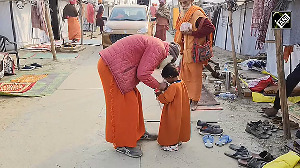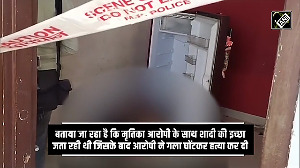The World Trade Organistion members are making an all-out effort to restart the multilateral talks after negotiations collapsed in Cancun last September.
However, developing countries still appear unconvinced about the extent of agricultural subsidies that will be reduced by developed countries like the United States and the European Union.
While US Trade Representative Robert Zoellick is expected to visit India later this month as part of a worldwide tour to break the logjam on the trade talks, the alliance of developing countries on agriculture (G 20), comprising India, China, Brazil, South Africa and Argentina and some other nations, on Monday said they were ready to meet the US, whenever Washington was ready.
The G-20 members are also slated to meet on February 12 to discuss their future strategy.
While Zoellick's itinerary for India has not been finalised, the visit will be his first since his two-day trip to the Capital in 2001 on the eve of the Doha ministerial, where the present round of talks were launched.
It also comes barely a month after European Union Trade Commissioner Pascal Lamy's day-long trip where he discussed ways to break the logjam, including an offer to eliminate subsidies on agricultural products of interest to developing countries like India.
The USTR had last month written to trade ministers from WTO member countries to go ahead with the stalled trade talks and said the US elections later this year would not affect the negotiations.
Commerce ministry officials said India was always keen on the commencement of negotiations but was not willing to open its markets, particularly in the agricultural sector, to the extent demanded by developed countries.
They were also critical of the recent backlash against outsourcing from India and said the move would have an impact on the multilateral talks on services. The officials did not comment on the EU offer of subsidy cuts on products of interest to developing countries.
The developments come at a time when the WTO is also making efforts to revive the stalled talks, scheduled to be concluded by the end of the year.
The Geneva-based multilateral body is to announce the heads of the various negotiating groups next week.
WTO Director General Supachai Panitchpakdi had recently said there was a convergence of views among trade envoys in Geneva that some outline agreements in key areas, such as agriculture, were possible by the middle of the year, even if these would be a long way from a final deal.
He had also said the first half of the year would be crucial to whether the 146-state multilateral trade body had a hope of concluding the talks on lowering global barriers to commerce by a self-set target of the end of the year.






 © 2025
© 2025